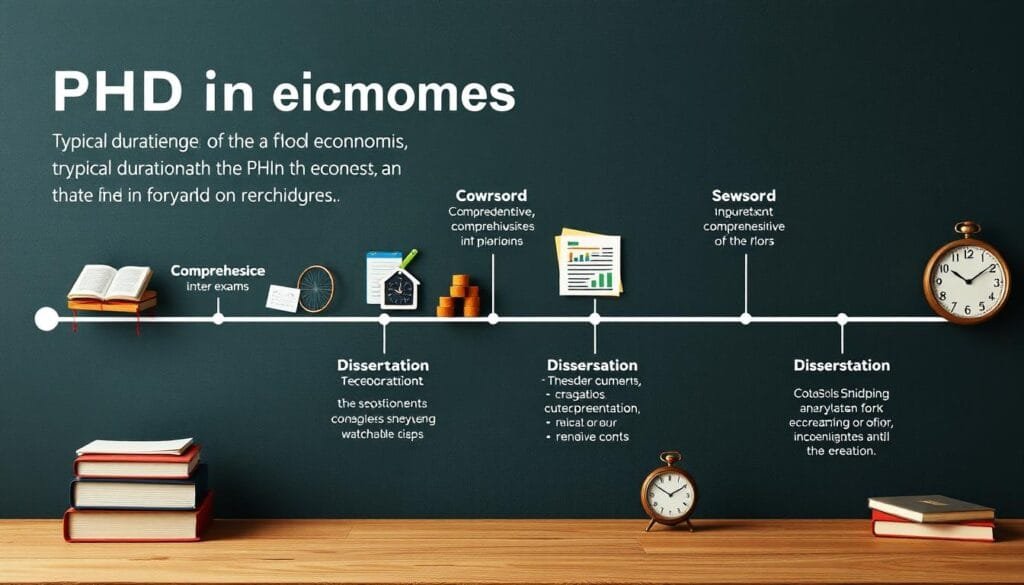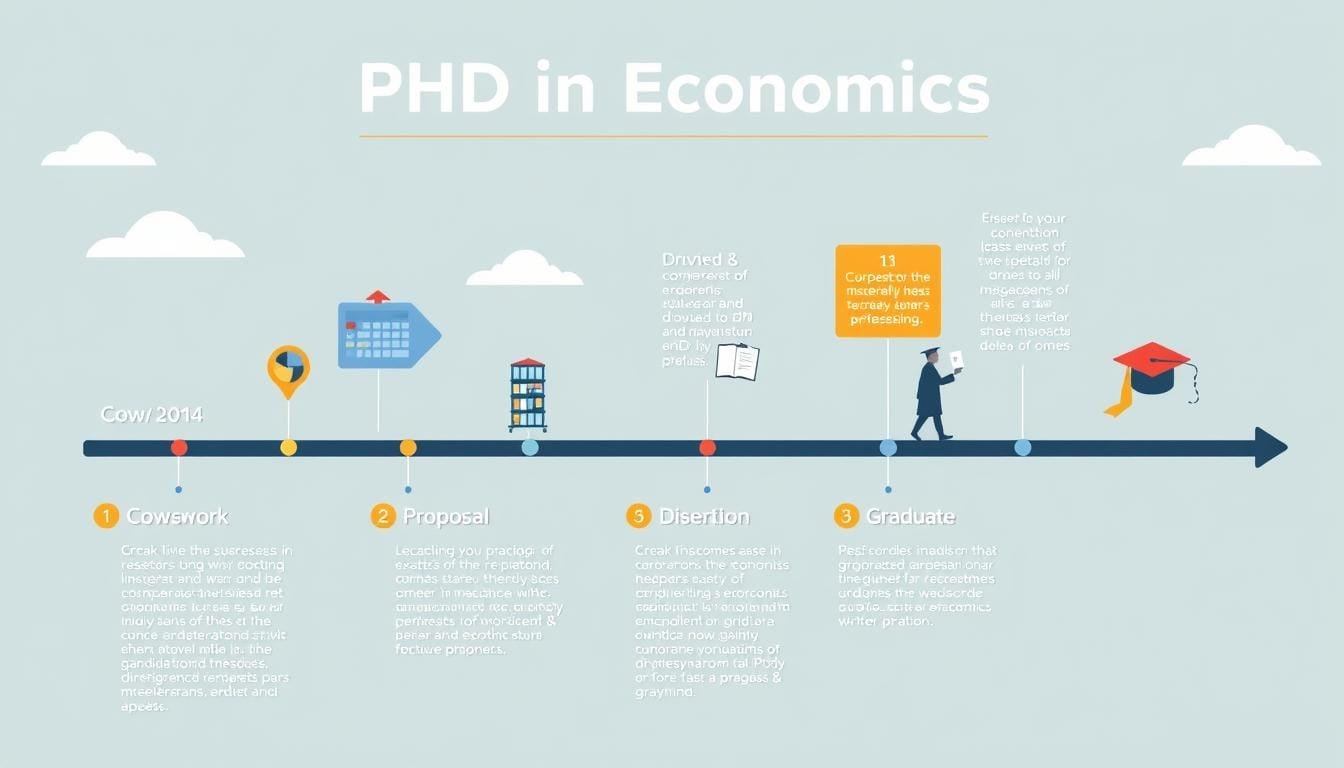Have you ever thought about why getting a PhD in Economics takes different times? Let’s dive into the reasons behind the PhD in Economics timeline. The journey is challenging but rewarding.
At world-leading places like the University of Pennsylvania, students face tough coursework before their big dissertation research. This often means about 5.25 years to get that degree.
There’s a lot of support like fellowships and assistantships to help students. These programs get you ready for big jobs in teaching, research, and making policies. We’ll show you what the usual Economics PhD completion time looks like and what affects the duration of Economics doctoral programs.
Getting to know the details of this journey can clear up what you can expect. Let’s find out how the PhD in Economics program can prepare you for a future in economic knowledge and leadership.
Key Takeaways
- The typical duration for PhD in Economics programs ranges from 3 to 5 years.
- Institutions like the University of Pennsylvania offer a structured curriculum that balances coursework with dissertation research.
- Funding through fellowships and assistantships is commonly available to support students financially.
- Graduates are prepared for high-impact roles in academia, research, and policy-making.
- Understanding the duration and structure of these programs can help prospective students plan their academic journey.
Overview of PhD in Economics Programs
A PhD in Economics is the top degree in the field. It focuses on economic theories and policies. Students grow intellectually, think critically, and boost their research skills.
What is a PhD in Economics?
It’s an advanced degree for deep economic analysis. Students must learn key economic theories and add new research to the field.
This degree preps people for jobs in academia, government, and more. It mixes coursework with in-depth research.
Core Components of the Program
The program trains students in economic principles and methods. It includes:
- Foundational courses in Microeconomic and Macroeconomic Theory
- Advanced electives on current economic issues
- Econometrics for quantitative analysis skills
For example, the University of Pennsylvania demands 16 course units. This ensures readiness for significant research in economics.
Here is the coursework and research required for full-time PhD students:
| Degree | Normative Study Period | Coursework Units | Research Courses | Stipend and Awards |
|---|---|---|---|---|
| M.Phil. degree holders | 3 years | 21 units (18 required, 3 elective) | ECON 8003, ECON 8006, ECON 8012 | HK$18,725 monthly, HK$40,000 first year, HK$20,000 subsequent years |
| Non-M.Phil. degree holders | 4 years | 27 units (18 required, 9 elective) | ECON 8003, ECON 8006, ECON 8012 | HK$18,725 monthly, HK$40,000 first year, HK$20,000 subsequent years |
After finishing coursework, students do research for their dissertation. This gives a full overview of what a PhD in Economics involves. It helps candidates prepare for their future roles.
Typical Duration and Structure
The PhD in Economics program length ranges from four to seven years. This is due to the structure of Economics PhD programs and how fast students move through their research. At first, students tackle core coursework and tough qualifying exams. The early coursework includes:
- Four semesters of college-level social science
- Six semesters of college-level math and science
- A minimum of 60 credits with at least a B+ grade average
- Completion of two semesters of college-level calculus
- Supplemental courses in microeconomics, macroeconomics, and statistical methods
Applicants hoping to join must finish two semesters of college-level calculus and economics by December 15 for the next fall term.
After the core courses and exams, students move to a research phase. Here’s how it usually goes:
- First two years: Core courses and qualifying exams
- Third year: Finish required courses and oral exams for MPhil
- Fourth year: Write MA thesis and start dissertation research
- Fourth to sixth year: Deep dive into dissertation research, writing, and defense

Top-ranked Doctoral programs in Economics set clear rules. For example:
| Year | Milestone | Details |
|---|---|---|
| Year 1-2 | Coursework | Complete courses in social science, math, and economics |
| Year 3 | Qualifying Exams | Pass core exams and do MA project |
| Year 4 | Oral Exams & MA Thesis | Finish courses and MA thesis for MPhil |
| Year 5-6 | Dissertation Research | Work on and defend dissertation |
The PhD in Economics program length and structure of Economics PhD show a clear path. This prepares candidates well for careers in economics.
Factors Affecting the Timeline
It’s important for future PhD candidates to understand what influences their study time. Several factors can change how long it takes to finish a program, often taking longer than expected.
Research Requirements and Dissertation
Research and writing a dissertation have big effects on the PhD timeline. Students face tough tasks like analyzing complex data and choosing new dissertation topics. These tasks often mean more time spent on doctoral studies, especially for those exploring new areas.

Coursework and Exams
Coursework and exams are also key. Doing well is essential, as struggles or delays can halt progress to the dissertation stage. Sadly, many students leave their programs early, with dropout rates near 70%. This shows how vital it is to keep up with studies and exams.
Funding and Assistantships
Money matters, too. Many students lean on grants, research, and teaching jobs for support. Having enough money greatly influences the PhD journey. For example, schools like Cornell pick how many PhD students to take based on funds. This highlights the need to secure enough support for smooth progress.
| Factors Affecting PhD in Economics | Influence |
|---|---|
| Research Requirements | Complex data analysis and fieldwork lengthen timelines |
| Coursework and Exams | Timely performance is critical for progress |
| Funding and Assistantships | Availability and stability of financial support impact duration |
How Long Does PhD in Economics Take
Getting a PhD in Economics takes a lot of time, often between 5 to 7 years. About 25% of students finish in less than 5 years. Around half are done by the 6-year mark. Nearly 80% wrap up within 7 years, and fewer than 10% take longer.
The duration of PhD in Economics depends on a few things. The research scope, dissertation efficiency, and past academic work play roles. Some top schools have quicker programs, letting students finish in about 4.5 years.
Universities have set timelines for their PhD programs that allow for research needs. Without an M.Phil., full-time students often need 4 years to finish, taking 27 units of coursework. Those with an M.Phil. might need only 3 years, with 21 units required.
Dissertation topics affect how long your PhD takes. Complex topics or methods can extend the process. Institutions try to help students finish efficiently with funds, assistantships, and advising.

| Duration | Percentage of Students |
|---|---|
| Under 5 years | 25% |
| Within 6 years | 50% |
| Within 7 years | 80% |
| Beyond 7 years | Less than 10% |
Also, completion times and time to complete Economics PhD vary by school. Top programs usually have shorter times thanks to their resources and structured settings. Knowing these details helps future students plan their academic journeys better.
Conclusion
Earning a PhD in Economics is a complex journey. It involves tough coursework, detailed exams, and deep research. Normally expected to take five years, this journey can vary. Factors like research needs, money help, and your own pace can change it. Though less than half finish their degrees in six to twelve years, it’s vital to plan for delays.
From 1980 to 2006, the time to get a doctoral degree in Education got longer. This matches trends in higher education. Key factors affecting time include being part of academic life, having enough funds, interaction with teachers, and personal drive. Knowing these factors helps students tackle challenges better.
Getting a PhD in Economics is not just for personal gain. Its graduates add to the field, shaping economic policies worldwide. Recognizing the tough parts and aiming for smart academic and financial plans is important. Staying dedicated to top research and clear communication helps reach this high goal.
FAQ
What is the typical timeline for completing a PhD in Economics?
A PhD in Economics usually takes four to seven years. This time can vary due to many things. The University of Pennsylvania aims to finish in about 5.25 years.
What are the core components of a PhD in Economics program?
The main parts of a PhD in Economics include courses on Micro and Macro Theory. They also include advanced classes and intense econometrics training. Each student must write a dissertation that offers new insights into economics.
How do research requirements affect the timeline for a PhD in Economics?
Research requirements can extend how long it takes to get a PhD. Coming up with unique dissertation ideas and analyzing lots of data can add time. Some students might also do fieldwork, which takes longer.
What role does funding play in the duration of a PhD in Economics?
Funding is very important for PhD students. It helps them focus on studies and research. When students get enough funding, they can concentrate better on their work.
What is the importance of passing comprehensive exams in a PhD in Economics program?
Passing comprehensive exams is a big step in a PhD. These exams are after the coursework part. They make sure students understand key economic concepts. Passing them is necessary to start working on a dissertation.
How flexible is the timeline for completing a PhD in Economics?
The timeline for a PhD can be flexible. Schools understand that research takes different amounts of time. How complex the research is and the student’s own pace can change the timeline.
What career paths are typically pursued by graduates of Economics PhD programs?
People with a PhD in Economics often work in schools, research, or policy-making. They use their knowledge to help understand the economy. And they also help make decisions that can affect everyone.
